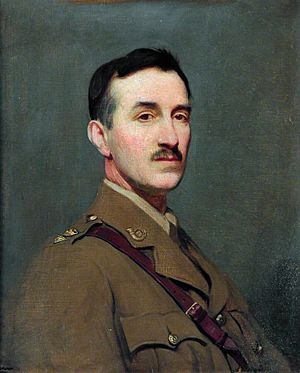Oliver Cyril Spencer Watson facts for kids
Quick facts for kids
Oliver Cyril Spencer Watson
|
|
|---|---|
 |
|
| Born | 7 September 1876 Westminster, London |
| Died | 28 March 1918 (aged 41) Rossignol Wood, France |
| Allegiance | |
| Service/ |
|
| Years of service | 1897 - 1904, 1909 - 1918 |
| Rank | Lieutenant Colonel |
| Unit | Green Howards 1st County of London Yeomanry (Middlesex, Duke of Cambridge's Hussars) |
| Commands held | 5th Battalion, King's Own Yorkshire Light Infantry |
| Battles/wars | Tirah Campaign (WIA) Boxer Rebellion First World War |
| Awards | Victoria Cross Distinguished Service Order |
Oliver Cyril Spencer Watson was a very brave English soldier. He was given the Victoria Cross (VC) after he died. This award is the highest and most respected honor for bravery in the face of the enemy. It is given to soldiers from Britain and Commonwealth countries. He also received the Distinguished Service Order (DSO).
Contents
Early Life and Military Career
Oliver Watson was born in Westminster, London, on September 7, 1876. He went to school at St Paul's School, London. Later, he trained to be an officer at the Royal Military College, Sandhurst.
In 1897, he joined the Green Howards regiment. He was sent to India with his battalion.
Early Battles and Promotions
Watson took part in the Tirah Expedition in India from 1897 to 1898. During this time, he was badly hurt. He also fought in the Boxer Rebellion in China in 1900.
He was promoted to Lieutenant in 1898. In 1903, he returned from India due to his injuries. He left active service in 1904.
In 1909, Watson joined a different unit called the County of London Yeomanry. He became a Lieutenant in 1911 and a Captain in 1913.
World War I Service
When the First World War began, Watson served in the Gallipoli campaign in April 1915. He was promoted to Major in July 1915. After this, he returned to the United Kingdom.
In 1916, he was sent to France as second-in-command of the 2/5th King's Own Yorkshire Light Infantry. He was mentioned in official reports for his bravery. He also received the Distinguished Service Order (DSO) in May 1917. He was wounded in battle at Bullecourt on May 3, 1917.
The Victoria Cross Action
Oliver Watson was 41 years old when he showed extreme bravery. He was an Acting Lieutenant-Colonel, leading the 5th Battalion, King's Own Yorkshire Light Infantry. This happened during the First World War.
Saving the Line
On March 28, 1918, a battle took place at Rossignol Wood in France. The soldiers tried to take back an enemy position. At first, they succeeded. However, the enemy was still holding strong in two key spots.
Lieutenant Colonel Watson realized he had to act fast. He led his small group of remaining soldiers to attack these strong points. He organized bombing teams and led attacks under very heavy enemy fire.
His group was outnumbered. So, he finally ordered his men to pull back to safety. He stayed behind in a trench to protect their retreat.
A Hero's Sacrifice
The attack he led was at a very important moment in the battle. His actions definitely saved the entire defensive line. Sadly, he was killed while covering his men's withdrawal.
Lieutenant Colonel Watson's grave is not known. He is remembered at the CWGC Cemetery in Arras, France. His name is listed under his original unit, the Middlesex Hussars (Yeomanry).
Watson's Medals
In 1956, Watson's medals were loaned to the Green Howards Regimental Museum. Then, in 1992, his niece's husband gave the medals as a gift to the Regiment. A copy of his Victoria Cross is on display at the Green Howards Regimental Museum in Richmond, North Yorkshire.

